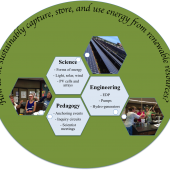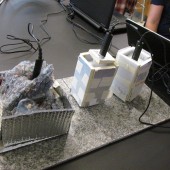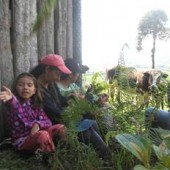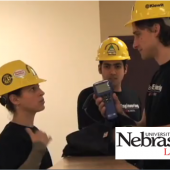
In August 2014, twenty-nine K-8 teachers from eleven Vermont schools engaged in the science, engineering and pedagogical practices of sustainable energy education. This week long workshop was organized by the Vermont Science Initiative (VSI), with an engineering and science instructor each from Norwich University and Lyndon State College respectively, and in partnership with the Vermont Energy Education Program (VEEP).
Teachers defined energy in terms of work, differentiated between transfers and transformations occurring across different energy forms, and gained a deeper conceptual understanding of renewable and nonrenewable energy sources. Opportunities for inquiry ranged from wind turbines, to electrical circuits, to light and Photovoltaic (PV) cells, and an energy bike. These, in combination with scientist meetings and a field trip to a nearby solar PV farm solidified their scientific literacy in the sustainable energy context. The teachers were also led through the Engineering Design Process (EDP) including concepts of design criteria and constraints to learn about sustainably engineering the energy components of systems. Teachers worked in groups to build an Archimedes Screw pump and determined the efficiency of a micro-hydro-generator. By the end of the week, post assessment test results revealed that the teachers had a 37% improvement in understanding various content areas.
By engaging elementary and middle school teachers in fun, hands-on exploration of sustainable energy we hope to bring this form of literacy to our youngest citizens, and future leaders and decision makers. The opportunity to continue engagement throughout the year with three follow-up sessions, and a forum to share the units they developed and best practices through the VT Agency of Education website will serve as a model for other stakeholders interested in implementing a similar program.
Continue Reading
Columbia Water & Light is a municipal electric and water utility with a number of energy education programs. By hiring a full-time education and outreach coordinator, Water & Light has been able to create connections with existing audiences in the community. Historical and current programs have earned awards for the utility. Water & Light’s education programs touch on the science, math and social forces behind energy in the community through projects with adults and children alike. By addressing energy education from a number of angles, Water & Light hopes to provide the community a holistic view of their energy use and how they can improve, with a goal of increasing participation in the utility’s efficiency programs. Short descriptions of a number of programs highlight the work that Water & Light’s education and outreach team has developed over a number of years.
Continue Reading
PDF: Kassam&AveryJSESpring2013 The Oikos of Rural Children[1]: A Lesson for the Adults in Experiential Education Karim-Aly S. Kassam, Department of Natural Resources & American Indian Program, College of Agriculture and Life Sciences, Cornell UniversityLeanne M. Avery, Department of Elementary Education and Reading, State University of New York College at Oneonta […]
Continue Reading
As we continue into the future, if we hope to move in the direction of sustainability, the question of energy efficiency in buildings old and new becomes increasingly relevant and key to success. Read this article by Dr. Terri Norton and Matija Ratovic to learn about efforts I the Midwest to prepare university students to take on this task.
Continue Reading